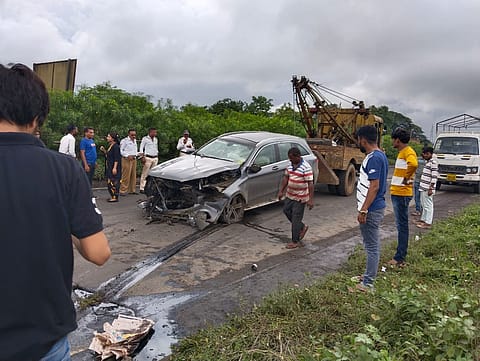Cyrus Mistry’s demise grim reminder of overspeeding risks
The highest number of deaths in road accidents was caused by overspeeding, amounting to 56% of the total road crash deaths (87,050) in 2021, as per the NCRB data.

The tragic and untimely demise of Cyrus Mistry, the former chairman of Tata Sons, in a high-speed car crash near Mumbai, is a morbid reminder of the excesses of overspeeding in India. "The tragic death of Cyrus Mistry once again highlights how dangerous our roads are. 60% of all fatal crashes were caused by speeding. As for the top reasons for injury, non-usage of seatbelts and collision with exposed hard structures along the road played key roles,” says Piyush Tewari, CEO & Founder, SaveLIFE Foundation, a non-profit policy, and advocacy organisation working towards road safety and emergency care in India. It is noteworthy that the ill-fated Mercedes-Benz GLC that Mistry was driven in purportedly covered 20 kilometres in merely 9 minutes before the crash.
Tewari’s claims are corroborated by the data compiled by the National Crime Records Bureau (NCRB). It points out that in 2021, overspeeding remains the biggest cause of road accidents—contributing to 56% of the total road crash deaths (87,050 deaths), followed by dangerous or careless driving, contributing to 27.5% of total crash deaths (42,853 deaths). The report also points out that most road accidents in India happen on national highways. The highest numbers of deaths in road crashes were reported on the national highways, which account for 34.5% (53,615 out of 1,55,622) of deaths.
In totality, the number of road crash fatalities increased by 16.8%, from 1,33,201 in 2020 to 1,55,622 in 2021. More alarmingly, the crash severity has increased from 37.5 in 2020 to 38.6 in 2021—the highest in the last two decades. “This incident and hundreds of others occurring every day call for a serious review of the lack of implementation of the Motor Vehicle (Amendment) Act, 2019, fixing road engineering issues leading to such crashes and injuries, and embarking on a mass awareness and training campaign to ensure higher compliance with safety standards,” Tewari adds.
The report also suggests that Mistry was not wearing a seatbelt at the time of the accident. SaveLIFE Foundation, with the support of Nissan Motor India, published a study in 2019, which found that while 70.5% of respondents affirmed the presence of rear seatbelts in their car, only 7% said that they use it regularly. The report points out two main reasons for the non-usage of rear seatbelts—people think its usage is not mandatory (37.8%) and low awareness about rear seatbelts (23.9%). Moreover, while the law mandates the use of rear seatbelts, only 27.7% of the respondents were aware of the law. Weak enforcement of the law also aggravates the dissuasion of not wearing rear seatbelts. 91% of the people surveyed reported that they had never been stopped by the police for the non-use of rear seatbelts.
As per the observations in strategic locations of six cities—Mumbai, Delhi, Jaipur, Kolkata, Lucknow, and Bengaluru—it was found that 98.2% of people did not use rear seatbelts. In Lucknow, Jaipur, and Kolkata no one used rear seatbelts. It is noteworthy that in 2017, 26,896 people died due to the non-usage of seatbelts in India. Rear seatbelts are an important safety device. According to WHO, the use of the rear seatbelt reduces the probability of being killed by 25% and injuries by 75%.